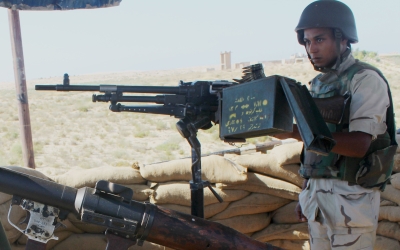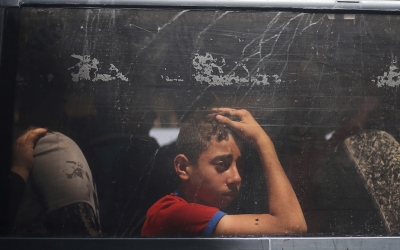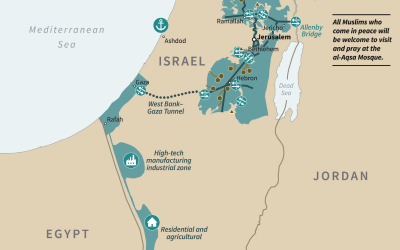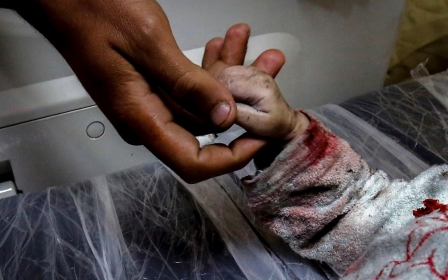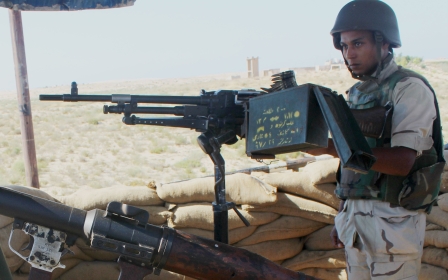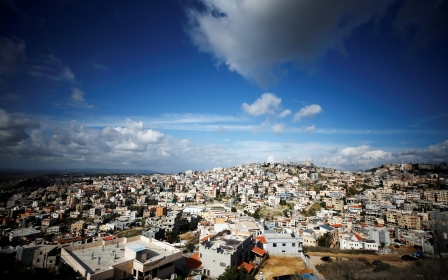Egypt building new wall along Gaza border
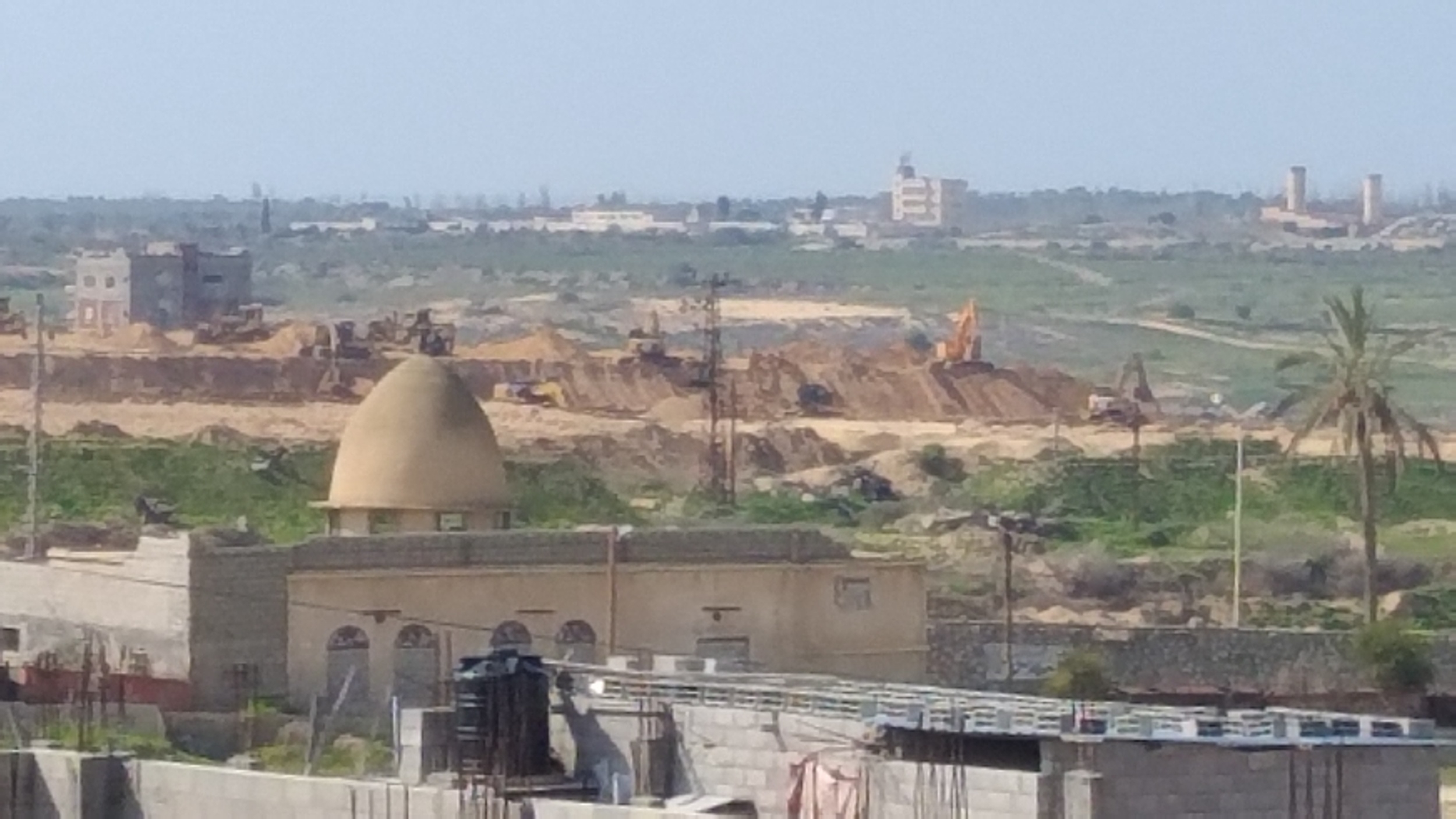
Egyptian security and military forces are working around the clock to build a new concrete wall on the Egyptian side of the border with the besieged Gaza Strip which they aim to have completed by mid-2020, Palestinian sources told Middle East Eye.
Egypt embarked on the first stage of construction on 27 January in the area extending from the Karm Abu Salem commercial crossing to the Rafah crossing. The wall is set to extend along two kilometres in its first stage, and stand six metres tall above ground and five metres deep below it.
Security expert in the Hamas-run Gaza Interior Ministry Muhammad Abu Harbeed said that the Palestinian leadership in Gaza understood Egyptian security needs, adding that the construction of the new wall enhanced the "security interests" of both sides.
But the move has not been welcomed by all in the besieged Palestinian territory, where some view the timing of the construction as suspicious given the recent unveiling of a US plan for Israel and Palestine that has been categorically rejected by the Palestinian leadership in the Gaza Strip and elsewhere.
Monitoring progress
The border between Egypt and Gaza is some 14 kilometres long in total.
The new wall is about ten metres away from an existing wall built by the Egyptian army after Palestinians stormed the border in early 2008, MEE was able to observe from the ground.
According to available information, the second stage of construction of the wall will focus on tightening control of separate border sections that extend from the Rafah border crossing to the Mediterranean Sea - sectors which the Egyptian army believes are weak points used for infiltration and smuggling in and out of Gaza.
A Palestinian officer working for Hamas’ security forces in Gaza revealed to MEE that Egyptian engineers and security and military experts have been periodically monitoring the progress of construction work from the Palestinian side of the border.
An Egyptian engineering and technical delegation visited Gaza Strip on 13 February and made a field tour along the border.
This visit came after a similar tour a few days earlier by an Egyptian security delegation led by Palestinian Major General Ahmed Abdel Khaliq, a member of Gaza’s General Intelligence Agency, on 10 February.
The Palestinian security officer, who requested anonymity, said that the construction of the wall and the Egyptian tours have been coordinated with Hamas, the de facto ruling party in the blockaded Palestinian territory, within the framework of new security arrangements with Egypt to prevent the infiltration of militants into the Sinai Peninsula.
Crackdown on tunnels
The decision to build a wall reaching deep into the ground is no accident, as Egypt under President Abdel Fattah el-Sisi has sought to shut down tunnels linking Gaza to Egypt’s Sinai Province.
Only a few hours after five Egyptian soldiers were killed by an explosive device near the North Sinai town of Sheikh Zuweid on 3 February, the Egyptian army announced that it had discovered a tunnel three kilometres long between the Palestinian and Egyptian sides of Rafah - a city which was split in two following Israel’s withdrawal from the Sinai Peninsula in 1982.
Egyptian security sources said at the time that the tunnel was intended “for the infiltration of terrorists from the Gaza Strip to plant improvised explosive devices on the Egyptian side and transporting weapons and explosives".
Since then-president Mohamed Morsi was deposed in a military coup in July 2013, Egyptian authorities have intensified their security and military operations in the Sinai, particularly cracking down on smuggling tunnels to Gaza.
The Egyptian army has largely succeeded in destroying hundreds of tunnels that Palestinians have dug to circumvent the suffocating siege imposed by Israel on the small coastal enclave since 2007.
In addition to destroying tunnels or flooding them with sewage water, Egypt has established a 1.5-kilometre long buffer zone along the border.
Hamas’ relationship with Egypt, which had been strong under Muslim Brotherhood leader Morsi’s rule, suffered after army chief Sisi rose to power.
But the Palestinian movement has since been able to somewhat mend its ties with Cairo by taking a series of measures that included establishing a 100-metre buffer zone along the border and clamping down on tunnels - in exchange for fewer closures at the border crossings with Egypt.
Egyptian security
While Egypt seeks to enhance its security in the Sinai by building the wall and taking new security measures and arrangements, Hamas sees the move as beneficial to its fight to eliminate drug trafficking, prevent criminal activities, and get rid of extremists on both sides of the border, according to Abu Harbeed, the Palestinian security expert.
“The operations of the Egyptian army on the Egyptian side of the border do not stop, and the construction of this wall falls within the context of a complete Egyptian security plan to impose security in the Sinai by strengthening some security-weak sections on the border, and ending the phenomenon of tunnels that are no longer necessary in light of an Egyptian commitment to open the Rafah crossing for individuals and basic needs of the population,” he said.
Hamas security services have thwarted several attempts by members of groups believed to be affiliated with or inspired by the Islamic State (IS) group to smuggle out of the Gaza Strip into the Sinai.
But an informed Palestinian security source revealed to MEE that a number of militants had succeeded in entering the Sinai recently, leading Hamas to commit to take more stringent security measures on both sides of the border as part of its agreement with Egypt.
Abu Harbeed said that Hamas and Egypt have passed the stage of exchanging accusations of responsibility for infiltration, and have reached a stage of understanding and agreement on the need for joint control.
According to Abu Harbeed, Egypt provided security forces in Gaza with equipment and other means to help them tighten control on the Palestinian side of the border in line with Egyptian security needs.
But Ibrahim Habib, a lecturer at the al-Rebat police academy in Gaza, does not see the value of building the new wall in terms of security.
He described the timing of the construction as "suspicious" given the US administration’s unveiling in January of its controversial plan for Israel and Palestine, saying the proposal known colloquially as the “deal of the century” was “forcing the resistance in Gaza to accept the status quo”.
The construction of the wall and new security measures on both sides of the border coincide with US President Donald Trump's proposal to expand the Gaza Strip by adding to it new lands in the Negev desert adjacent to the Egyptian Sinai - while formalising the annexation of East Jerusalem, Israeli settlements and large swathes of land in the occupied West Bank, and creating a demilitarised, fragmented Palestinian state with little to no sovereignty.
Habib wondered why Egypt has focused on its short border with Gaza, while there are many entry points for the infiltration of militants, whether by sea or through Egypt’s long land borders with other countries.
“Hamas has been making great efforts for years to protect Egyptian national security through security reinforcements from the deployment of additional forces and new buildings on the Palestinian side of the border," he said.
"I do not think that this wall has a real security dimension. Its construction is in line with the [Israeli] occupation’s policy of building walls.”
Abu Harbeed, however, refused to link the construction of the wall to the Trump plan: “It has nothing to do with the deal; it’s all about security for Egypt.”
This article is available in French on Middle East Eye French edition.
Middle East Eye propose une couverture et une analyse indépendantes et incomparables du Moyen-Orient, de l’Afrique du Nord et d’autres régions du monde. Pour en savoir plus sur la reprise de ce contenu et les frais qui s’appliquent, veuillez remplir ce formulaire [en anglais]. Pour en savoir plus sur MEE, cliquez ici [en anglais].


